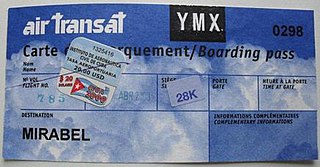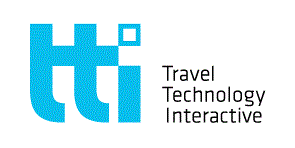Related Research Articles
Sabre Global Distribution System, owned by Sabre Corporation, is a travel reservation system used by travel agents and companies to search, price, book, and ticket travel services provided by airlines, hotels, car rental companies, rail providers and tour operators. Originally developed by American Airlines under CEO C.R. Smith with the assistance of IBM in 1960, the booking service became available for use by external travel agents in 1976 and became independent of the airline in March 2000.
Sabre Corporation, a travel technology company headquartered in Southlake, Texas, is the largest global distribution systems (GDS) provider for air bookings. The company's primary product, the Sabre Global Distribution System, and others like it, act as neutral intermediaries, connecting travel suppliers like airlines and hotels with travel sellers like agencies. They offer real-time availability and pricing, making them important for corporate travel management.
A passenger name record (PNR) is a record in the database of a computer reservation system (CRS) that contains the itinerary for a passenger or a group of passengers travelling together. The concept of a PNR was first introduced by airlines that needed to exchange reservation information in case passengers required flights of multiple airlines to reach their destination ("interlining"). For this purpose, IATA and ATA have defined standards for interline messaging of PNR and other data through the "ATA/IATA Reservations Interline Message Procedures - Passenger" (AIRIMP). There is no general industry standard for the layout and content of a PNR. In practice, each CRS or hosting system has its own proprietary standards, although common industry needs, including the need to map PNR data easily to AIRIMP messages, has resulted in many general similarities in data content and format between all of the major systems.

A boarding pass or boarding card is a document provided by an airline during airport check-in, giving a passenger permission to enter the restricted area of an airport and to board the airplane for a particular flight. At a minimum, it identifies the passenger, the flight number, the date, and scheduled time for departure. A boarding pass may also indicate details of the perks a passenger is entitled to and is thus presented at the entrance of such facilities to show eligibility.

An electronic ticket is a method of ticket entry, processing, and marketing for companies in the airline, railways and other transport and entertainment industries.

Amadeus IT Group, S.A. is a major Spanish multinational technology company that provides software for the global travel and tourism industry. It is the world's leading provider of travel technology that focus on developing software for airlines, hotels, travel agencies, and other travel-related businesses.
QIK is an intelligent airline agent application first developed in the late 1980s as a front end to mainframe computer reservations systems.

The Airline Tariff Publishing Company is a privately held corporation that engages in the collection and distribution of fare and fare-related data for the airline and travel industry. ATPCO currently works with more than 440 airlines worldwide, and it supplies more than 99% of the industry’s intermediated fare data to all the major airfare pricing engines, storing over 351 million active fares in its database and managing an average of 18 million fare changes each day.
Interlining, also known as interline ticketing and interline booking, is a voluntary commercial agreement between individual airlines to handle passengers traveling on itineraries that require multiple flights on multiple airlines. Such agreements allow passengers to change from one flight on one airline to another flight on another airline without having to gather their bags or check-in again. Airlines can also promise free rebooking if the connection is lost due to a delay.
Airline reservation systems (ARS) are systems that allow an airline to sell their inventory (seats). It contains information on schedules and fares and contains a database of reservations and of tickets issued. ARSs are part of passenger service systems (PSS), which are applications supporting the direct contact with the passenger.
Videcom International Limited is a United Kingdom travel technology company based in Henley-on-Thames. It designs, develops and provides modern computer reservations systems to airlines and the travel industry, specializing in the hosting and distribution of airline sales.
Amadeus is a computer reservation system owned by the Amadeus IT Group with headquarters in Madrid, Spain. The central database is located at Erding, Germany. The major development centres are located in Sophia Antipolis (France), Bangalore (India), London (UK), and Boston. In addition to airlines, the CRS is also used to book train travel, cruises, car rental, ferry reservations, and hotel rooms. Amadeus also provides New Generation departure control systems to airlines. Amadeus IT Group is a transaction processor for the global travel and tourism industry. The company is structured around two key related areas—its global distribution system and its "IT Solutions" business area.
Galileo is a computer reservations system (CRS) owned by Travelport. As of 2000, it had a 26.4% share of worldwide CRS airline bookings. In addition to airline reservations, the Galileo CRS is also used to book train travel, cruises, car rental, and hotel rooms.

Travelport Worldwide Ltd provides distribution, technology, and payment solutions for the travel and tourism industry. It is the smallest, by revenue, of the top three global distribution systems (GDS) after Amadeus IT Group and Sabre Corporation.
A miscellaneous charges order (MCO), also known as miscellaneous purpose document (MPD), is an accountable IATA document, similar to an old-style airline ticket, used to process the payment of travel arrangements. They are issued by airlines, but normally pay for services other than airfares. An MCO may be used to purchase most services offered by airlines, hotels and tour operators.

TravelSky Technology Limited is the dominant provider of information technology services to the Chinese air travel and tourism industries. Its clients include airlines, airports, air travel suppliers, travel agencies, individual and corporate travel consumers and cargo services. It is listed on the Hong Kong stock exchange and its majority shareholder or parent group is the China TravelSky Holding Company, a State-owned enterprise (SOE).

Travel Technology Interactive Group is a French-based international company. It is specialized in IT software for the management of airlines. It provides an Airline Reservations System with an integrated Global Distribution System (GDS).
Navitaire LLC is a subsidiary of Amadeus IT Group. Navitaire primarily offers systems for passenger reservations, travel commerce, ancillary revenue and merchandising, as well as revenue accounting and revenue management to airlines and rail companies.

WorldTicket (WT) was founded in 2002 and is a global provider of information technology and software to airlines. In May 2022, it was announced that WorldTicket had been acquired by 777 Partners, a Miami-based private investment company.
An airfare is the fee paid by a passenger for air transport and is made up of the charge for a passenger to fly from an origin to destination and includes the conditions, rules and restrictions for travelling on the airfare.
References
- ↑ "News Briefs: Travelport-Swiss Pact; Finnair Ancillary Sales". Archived from the original on 21 December 2013. Retrieved 22 March 2012.
- ↑ "Air China Leads the Chinese Aviation Industry in Introducing EMD - Electronic Miscellaneous Document - Dépêches - Actualité aéronautique - AeroWeb-fr.net". www.aeroweb-fr.net.
- ↑ "IATA e-services". Archived from the original on 22 March 2012. Retrieved 21 March 2012.